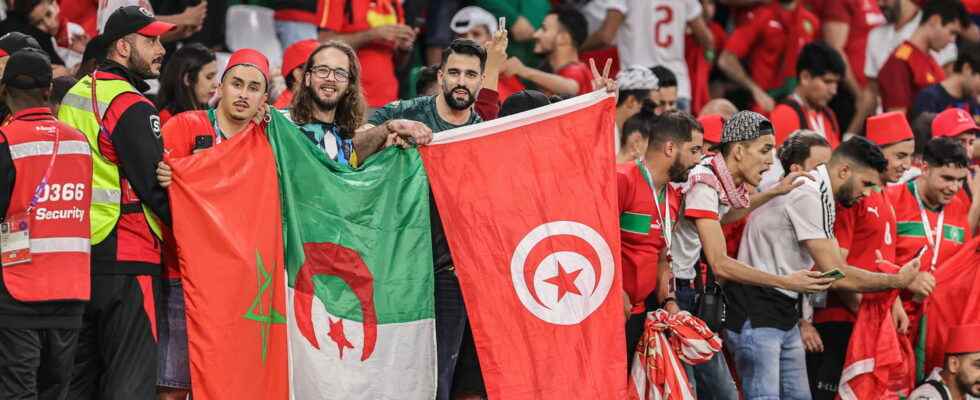Morocco’s exploits in this 2022 World Cup have generated a rare surge of enthusiasm, shared by most Arab countries. And the confrontation with France gives yet another dimension to this fervor.
The confrontation between Morocco and France, this Wednesday, December 14, in the semi-finals of the Football World Cup, has a much broader dimension than just the sporting context. The complex history between the two nations, the importance of the Moroccan community in France (French of Moroccan origin or dual nationals in France) make this meeting a major current event. Proof of this is the flood of comments from political figures welcoming, which a great moment of sharing, which a moment of tension already written.
It must be said that when Morocco faces France on a football field, a rivalry is established for 90 minutes between two nations which have not fully unraveled their common past nor the traces left by colonization, decolonization, immigration of the 1960s and imbalanced economic power relations. Moreover, Morocco embodies in this competition the pride of the Arab world: not to perceive it would be not to understand what is at stake. If we try to summarize a little, we could agree that this France-Morocco match brings up 3 points or sensitive questions.
1/ A symbolic revenge on France?
This is the couplet that is mobilized by the far right, when France faces a nation that was colonized by Paris. Let us recall that Morocco was a French protectorate for more than half a century… The incidents which occurred in certain communes after Morocco’s victory against Spain gave food for thought to those who were convinced that France was losing a “war of civilization”, the one that is part of the fantasized history of the “great replacement” of the natives by the Muslim community.
On France 2, Monday, December 12, the RN Sébastien Chenu, vice-president of the National Assembly, already put a coin in the suspicion machine: “The match should not sound like a political or historical revenge. However, we have this feeling a bit when we see the altercations that there may have been. Probably that some are French because there are a certain number of interests to be, but they have a heart that beats for another country. (…) This raises the question of assimilation”. Same story with Jordan Bardella, on RMC the same day, considering that the excesses that have occurred – and which will inevitably occur as after many football matches at stake – were part of “thirty years of failure of the immigration policy, and in particular of assimilation”.
2/ Suspicion of a Moroccan community that does not like France
Basically, the case against Moroccan immigrants or French people of Moroccan origin is as follows: if they support Morocco rather than France in this World Cup, it is because they are not sufficiently integrated and they don’t love France enough. It’s a pity that the proponents of this low-level analysis do not see what emerges from this enthusiasm for the Moroccan team: never has a Moroccan team shone so much in a collective sport at this level, and all sports lovers were one day swept away by the infectious joy and inspiring energy of the little Thumbs.
Whether there is an identity tension in all this, an expression of unease with regard to the French integration model, or questions to be asked about the feeling of belonging to the community of tricolor spirit, It’s very likely. But to see only that would be to observe what is happening only through the small end of the telescope: the performance of Moroccans gives the possibility to those who feel close to this country to commune around success, victory. They benefit from a rare light, which Moroccan immigrants are often deprived of in collective representations.
3/ The Palestinian question carried by Morocco
The Atlas Lions – as the Moroccan players are nicknamed – managed in this World Cup to create a new feeling of pride, of fraternal fervor in the Arab world. “For the first time in a long time, the Arab people are putting their differences aside. I myself am not a big fan of football in normal times, but, for the past few days, this passion has been contagious”, sums up to the world Faisal Abbas, managing editor of the Saudi English-language newspaper Arab News.
It has not escaped anyone that several Moroccan players waved Palestinian flags, starting with PSG defender Achraf Hakimi after the victory against Canada and then against Spain. In the stands, increasingly red and green – the colors of the Moroccan team – the signs of support for Palestine are evident. What has emerged there, in Qatar, is of course being watched with enthusiastic curiosity in the Palestinian territories. The sporting exploits of Moroccans have generated scenes of jubilation in the major cities of the West Bank and in East Jerusalem.
Will this support for the Palestinian cause have political repercussions? It is unlikely, but it says something about the way the Arab peoples consider this subject: the question of the territories occupied by Israel mobilizes and remains extremely sensitive, even though it is very little discussed in international exchanges. between the great powers.
